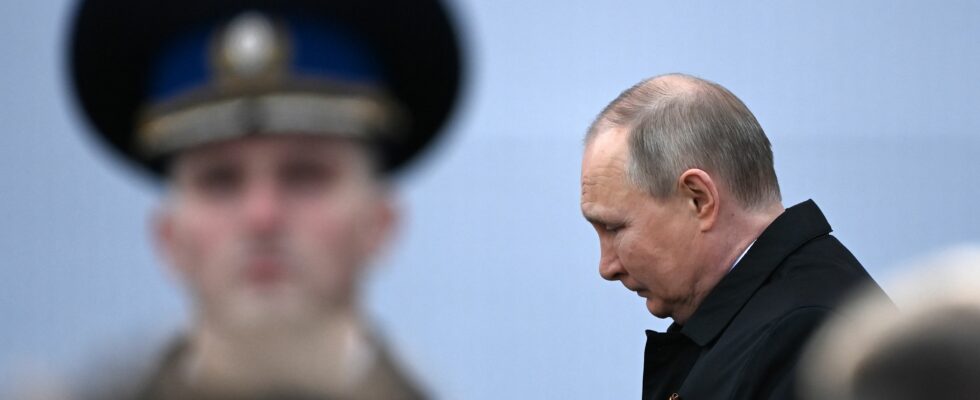This is a first since the invasion of Ukraine. This Thursday, March 2, the Kremlin for the first time recognized fighting on Russian soil, while Ukraine hinted that it could be a set-up, to remobilize Russian public opinion.
Who were the fighters, referred to as “saboteurs” by Russia? What could change this “incursion”, whose balance sheet officially stands at two dead for the moment? How are the Russian and Ukrainian authorities reacting? Response elements.
What happened ?
“Incursion”, “hostage taking”… the vagueness remains. Russia regularly changes versions. And the allegations of “set up” help to make the incident unreadable. The alert comes first from the local Russian authorities. According to the governor of the Briansk region, on the border with Ukraine, this Thursday, “a reconnaissance and sabotage group infiltrated the village of Lioubetchané, from Ukraine”. “Saboteurs” loaded with explosives, pushed back to Ukraine, according to the Russian security services (FSB).
Russian officials then delivered several versions, ranging from shootings at a school bus to a hostage-taking, passing by the death of a child. Still, no image has corroborated these statements, and the information has not been confirmed by Westerners. Finally, the FSB reported two dead, and a wounded child. Regardless, the alleged incident was immediately taken very seriously in Russia.
Who claims the attack?
The “Russian Volunteer Corps” (RDK) claimed responsibility for the attack. “This group was created in 2022 by a neo-Nazi who calls himself Denis Nikitine. The latter has lived in Ukraine and Germany, where he is forbidden to stay”, specifies Carole Grimaud Potter, geopolitical analyst, specialist in Russia and the post-Soviet spaces.
The RDK is a unit of Russian fighters working for Ukraine. Its members, close to the extreme right, have nurtured close ties with elements of the Azov battalion of the Ukrainian army. “They would have crossed the border and would have made an incursion. This event is intended to show the Russian people that they must rise up against Putin”, adds General Trinquand, former head of the French military mission to the UN.
What does Ukraine say?
The Ukrainian presidency immediately denounced a “deliberate provocation” by Moscow. “Russia wants to scare its population to justify” its invasion of Ukraine, declared on Twitter Mykhaïlo Podoliak, adviser to Volodymyr Zelensky, suggesting that it was an instrumentalization of the regime.
The fact remains that until now, Ukraine has always been careful not to claim attacks in Russia, so it is difficult to see clearly. “This is what Ukraine does systematically, when Russia claims to have suffered attacks on its soil. There has been a lot of talk about drone attacks and unexplained explosions in Russia in recent months. Zelensky never said that it was him”, details Carole Grimaud Potter.
What does Russia say?
The Kremlin’s response is particularly interesting. It is a “terrorist attack”, according to the spokesman of the Russian presidency. As a result, Vladimir Putin would have canceled a planned trip to the Russian Caucasus. He meets this Friday with the National Security Council. “This reaction is singular, and deserves attention. Ordinarily, Russia seeks rather to stifle. There, Putin wants to embody a strong response”, underlines General Trinquand.
“All of this is very anxiety-provoking for the population, fueled by the Russian media. We are in a form of paranoia, with the perpetual impression of a besieged fortress. In Russia, we are already rehabilitating the construction of nuclear shelters, we are putting in place anti-missile batteries. The incident is used by the government to feed the discourse of unity, of investment in the war”, adds Carole Grimaud Potter.
Is a “set-up” possible?
Many observers and Ukrainian officials have hinted that the operation could turn out to be “a set-up” by Moscow. Be that as it may, it is Russia’s response that counts, and which will have to be analyzed in the coming weeks: “Were the perpetrators of these abuses manipulated by the FSB? Or is it a true autonomous incident? Still, in the end, Vladimir Putin obviously chose to exploit it. The Russian president immediately gave in to ‘our sacred land is under attack'”, directs General Trinquand.
A vision shared by Carole Grimaud Potter. “Whether the Bryansk attacks are fabricated or not, the result will be to have touched the soft spot of Russian power. The cancellation of Putin’s trip shows the importance he wishes to attach to this event and the message he wants to send to the Russian population: the state is under attack and the next decisions will therefore be justified”. Which ones? So far, nothing specific has been announced. The two specialists recall that in 2004 an attack in a school in Beslan had triggered a very strong armed response from Russia in Chechnya, and had fueled the authoritarian turn of the regime. However, the balance sheet is significantly different. The attack then led to the death of 334 people.
How could Russia react in the longer term?
“Vladimir Putin has passed an executive order for the defense industries to prepare for possible martial law. We see that Russia is preparing for what it sees as an increased threat. This whole context could prepare the ground on the side of the Russian population, to make accept a martial law which would go further in the mobilization of war”, details Carole Grimaud Potter.
